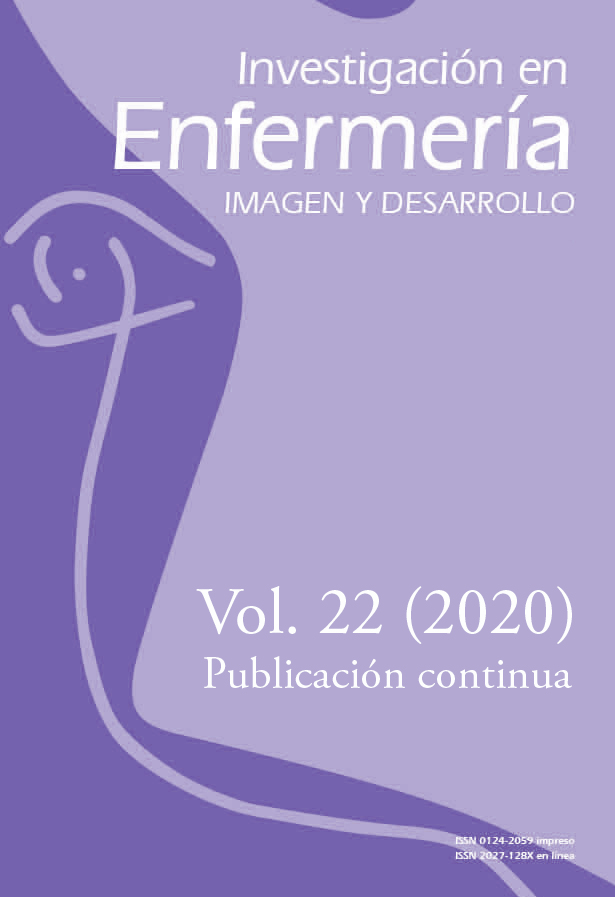Resumen
Introducción: Las enfermedades de carácter crónico se han convertido en una de las preocupaciones más importantes de la sociedad moderna, debido a que significa una estadía permanente en los sistemas de salud, al tiempo que implican que un tercero se haga cargo del enfermo. Objetivo: Describir el perfil del cuidador primario del paciente diabético en dos comunidades mexicanas. Método: Estudio transversal descriptivo de agosto de 2017 a noviembre de 2018 con 38 cuidadores primarios de personas que padecen diabetes mellitus tipo 2, provenientes de dos clínicas universitarias de atención a la salud (CUAS). En la CUAS Zaragoza participaron 17 cuidadores primarios, y en la CUAS Reforma, 21. Se aplicó el instrumento denominado Valoración para el cuidador primario. Resultados: La edad promedio de los cuidadores es de 60 años ± 15 años. El género predominante es el femenino. La mayoría tiene estudios de primaria y el 68 % padece alguna enfermedad. El parentesco que predominó con los pacientes son esposas(os). El 73 % de los cuidadores cuenta con apoyo de sus familiares. El 55 % tiene un conocimiento regular sobre la diabetes mellitus y en los valores del cuidador predominó tenerle respeto a su paciente. Conclusiones: Conocer el perfil de los cuidadores permitirá a los profesionales de enfermería establecer diferentes estrategias de salud que les permita reforzar el conocimiento acerca de la enfermedad y así mejorar el estilo de vida de los pacientes para brindarles apoyo, dado el impacto y el desgaste que genera ser cuidador primario en una enfermedad.
2. Hernández-Ávila M, Gutiérrez JP, Reynoso-Noverón N. Diabetes mellitus en México: el estado de la epidemia. Salud Pública Mex. 2013;55(2):129-136. http://dx.doi.org/10.21149/spm.v55s2.5108
3. Venegas-Bustos BC. Habilidad del cuidador y funcionalidad de la persona cuidada. Aquichan [internet]. 2006;6(1):137-47. Disponible en: https://aquichan.unisabana.edu.co/index.php/aquichan/article/view/87
4. Moraga PR. Estudio cualitativo sobre la experiencia subjetiva de la enfermedad en diabéticos. Rev Chil Salud Pública [internet]. 2005;9(3):162-8. Disponible en: https://revistasaludpublica.uchile.cl/index.php/RCSP/article/view/20158
5. Vinaccia S, Quiceno M. Calidad de vida relacionada con la salud y enfermedad crónica: estudios colombianos. Acta. Colomb. Psicol. 2012;6(1):123-36. http://dx.doi.org/10.14718/ACP.2017.20.1.4
6. Guerrero-Nava JA et al. El cuidador primario, su paciente terminal y la enfermería. Rev Enferm Inst Mex Seguro Soc. 2016;24(2):91-8.
7. Ruiz-Robledillo N, Moya-Albiol L. El cuidado informal: una visión actual. Rev Electrón Motiv Emoc [internet]. 2012;1:22-30. Disponible en: http://reme.uji.es/reme/3-albiol_pp_22-30.pdf
8. Pinzón-Rocha M, Aponte-Garzón L, Hernández-Páez R. Experiencia de los cuidadores informales en el manejo de la diabetes mellitus tipo II. Orinoquia. 2013;17:241-51. https://doi.org/10.22579/20112629.22
9. Comas D’argemir Dolors. Los cuidados de larga duración y el cuarto pilar del sistema de bienestar. Rev Antropol Soc. 2015;24:375-404. https://doi.org/10.5209/rev_RASO.2015.v24.50663
10. Hernández-Sampieri R, Fernández-Collado C, Baptista-Lucio P. Metodología de la investigación. 4.ª ed. México: McGraw Hill; 2008. pp. 278-9.
11. Chacón S, Pérez JA, Holgado FP, Lara Á. Evaluación de la calidad universitaria: validez de contenido. Psicothema. 2001;13(2):294-301.
12. Martínez-Cepero FE. Necesidades de aprendizaje del cuidador principal para el tratamiento del anciano con demencia tipo Alzheimer. Rev Cubana Enferm [internet]. 2009 [citado 2018 nov 13];25:(3-4). Disponible en: http://scielo.sld.cu/pdf/enf/v25n3-4/enf06309.pdf
13. Ortiz-Claro YG, Lindarte-Clavijo AA, Jiménez-Sepúlveda MA, Vega-Angarita OM. Características sociodemográficas asociadas a la sobrecarga de los cuidadores de pacientes diabéticos en Cúcuta. Revista Cuidarte. 2013;4(1):459-66. https://doi.org/10.15649/cuidarte.v4i1.5
14. Ambriz-López MC, Villalobos-Arámbula LM, Gallegos-Torres RM, Xeque-Morales AS, Hernández-Castañón MA, Palomé-Vega G. Perfil del cuidador principal y su relación con el cuidado de enfermería. Rev Enferm Inst Mex Seguro Soc [internet]. 2014;22(3):123-9. Disponible en: https://www.medigraphic.com/pdfs/enfermeriaimss/eim-2014/eim143b.pdf
15. Quero-Rufián A, Briones-Gómez R, Prieto-Rodríguez MA, Navarro López A, Pascual-Martínez N, Guerrero-Ruiz C. Perfil y realidad social de los cuidadores familiares en un hospital de traumatología y rehabilitación. Nure Investigación [internet]. 2004;(9):1-14. Disponible en: https://www.nureinvestigacion.es/OJS/index.php/nure/article/view/192/0
16. Lara-Palomino G, González Pedraza Avilés A, Blanco-Loyola LA. Perfil del cuidador: sobrecarga y apoyo familiar e institucional del cuidador primario en el primer nivel de atención. Rev Esp Med-Quir [internet]. 2008;13(4):159-66. Disponible en: https://www.medigraphic.com/pdfs/quirurgicas/rmq-2008/rmq084c.pdf
17. Compean GJM, Silerio VJ, Castillo DR, Parra DML. Perfil y sobrecarga del cuidador primario del paciente adulto mayor con afecciones neurológicas [internet]. Rev Conamed. 2008;13(Suppl 1):S17-21. Disponible en: https://imbiomed.com.mx/1/1/articulos.php?method=showDetail&id_articulo=48629&id_seccion=699&id_ejemplar=4928&id_revista=41
18. Rivera-Mora H, Dávila-Mendoza R, González Pedraza-Avilés A. Calidad de vida de los cuidadores primarios de pacientes geriátricos de la Clínica de Medicina Familiar Dr. Ignacio Chávez. Rev Esp Med-Quir. 2011;16(1):27-32.
19. Ramírez-Alvarado GG. Conocimientos y habilidades de los cuidadores de adultos con diabetes tipo 2 [tesis de maestría]. Bogotá: Universidad Nacional de Colombia; 2012.
20. Eterovic-Díaz C, Mendoza-Parra S, Sáez-Carrillo K. Habilidad de cuidado y nivel de sobrecarga en cuidadoras/es informales de personas dependientes. Enferm Global [internet]. 2015;(38):235-48. Disponible en: http://scielo.isciii.es/pdf/eg/v14n38/administracion4.pdf
21. Vega-Angarita O, Mendoza-Tarazona MK, Ureña-Molina M del P, Villamil Santander WA. Efecto de un programa educativo en la habilidad de cuidado de los cuidadores familiares de personas en situación crónica de enfermedad. Rev Cienc Cuidado. 2008;1(5):5-19. https://doi.org/10.22463/17949831.927

Esta obra está bajo una licencia internacional Creative Commons Atribución 4.0.
Derechos de autor 2020 Investigación en Enfermería: Imagen y Desarrollo



